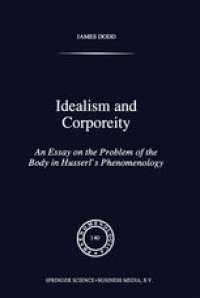
Ebook: Idealism and Corporeity: An Essay on the Problem of the Body in Husserl’s Phenomenology
Author: James Dodd (auth.)
- Tags: Phenomenology, Epistemology, Ontology
- Series: Phaenomenologica 140
- Year: 1997
- Publisher: Springer Netherlands
- Edition: 1
- Language: English
- pdf
In a way, the problem of the body in Husserl' s writings is relatively straightfo r ward: it is an exercise in faithful description and elaboration of a sense or mean ing, that of the "lived body," using the tools and methods of intentional analysis. What is to be described is nothing exotic, but a recognizable, familiar element of experience; further, it is not something limited to any special type of experience, but is ever-present, whether it is in the background or the center of attention. Thus the lived body is, in a way, the most mundane of topics in phenomenology, to be du1y noted as a matter of course--of course we should include the body in the analysis of lived space; of course the body is an element in the consciousness of other persons. Along with the obviousness of the task is the impression that, at least at the outset, the problem of the body does not appear to tax the resources of intentional analysis, forcing us to raise critical questions about the scope and limits of phenomenological philosophy. There is nothing extreme about the problem of the body-it demands neither that we discern structures of the end most interior of consciousness, as does the study of "internal time conscious ness," nor does it calion us to fix the sense of the normativity that constitutes the "logic" of the world by grounding it in an absolute foundation.
What is meant by `body' in Husserl's phenomenology?
`Body' is a thing that is `alive' or `animated' (beseelt). In Husserl, this concept covers a wide range of phenomena. It is the condition for the possibility of the event of the arrival of someone and my being in the position to meaningfully announce this presence. It is as `ensouled' that the `I' speaks and is spoken to. To be `without soul' means to be separated from the world and from other, incarnate beings.
But why rely on the concept of `soul' to understand such phenomena? Is this not a reprise of a metaphysics of the soul, one that posits the `mental' as a unique substance, an invisible mover of things?
This essay argues that the problem of the body is of central importance for Husserl's transcendental idealism. It is the key to the sense of human being as, despite its `worldliness', something transcendent with respect to the world, thus something `spiritual'.